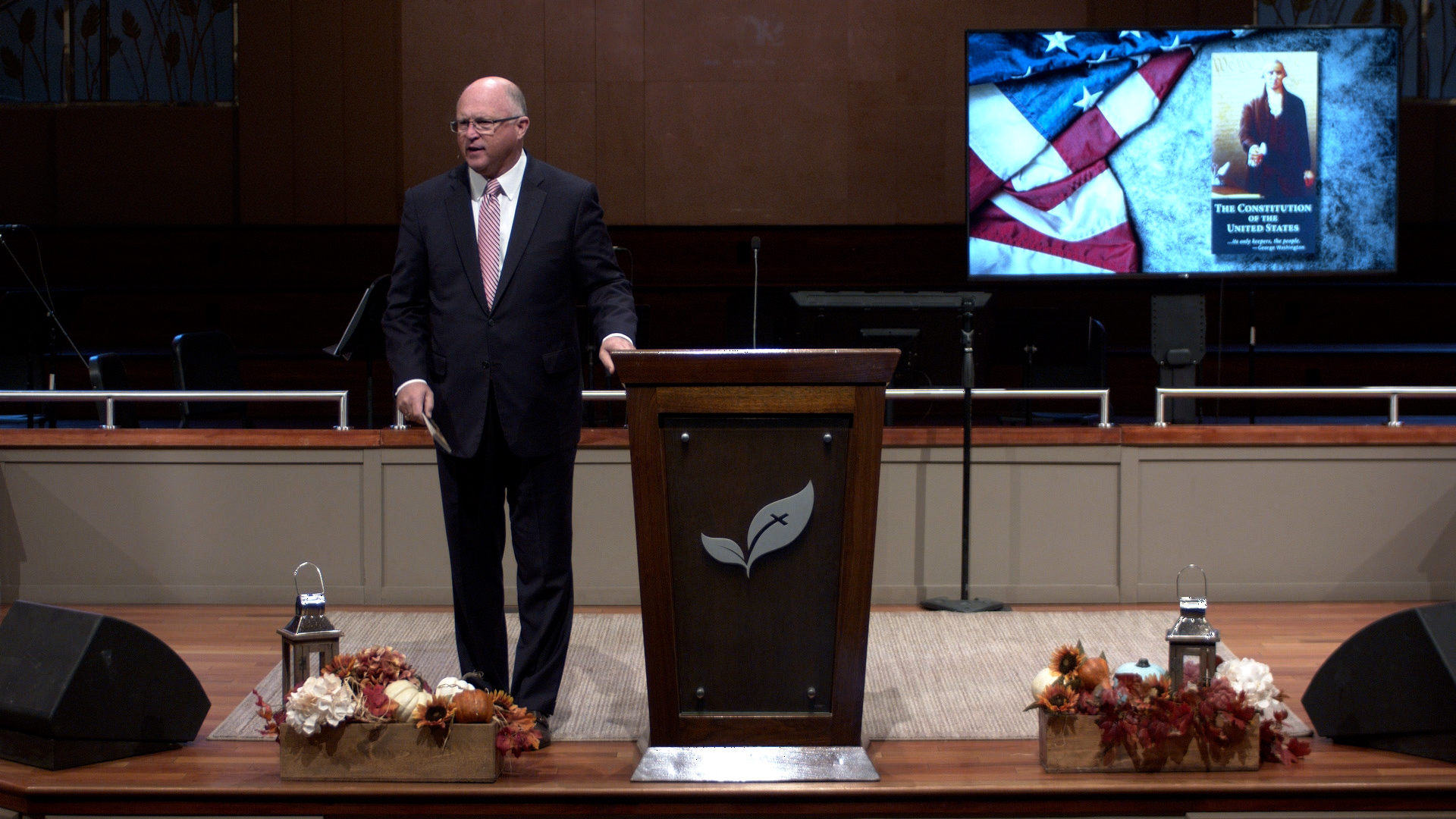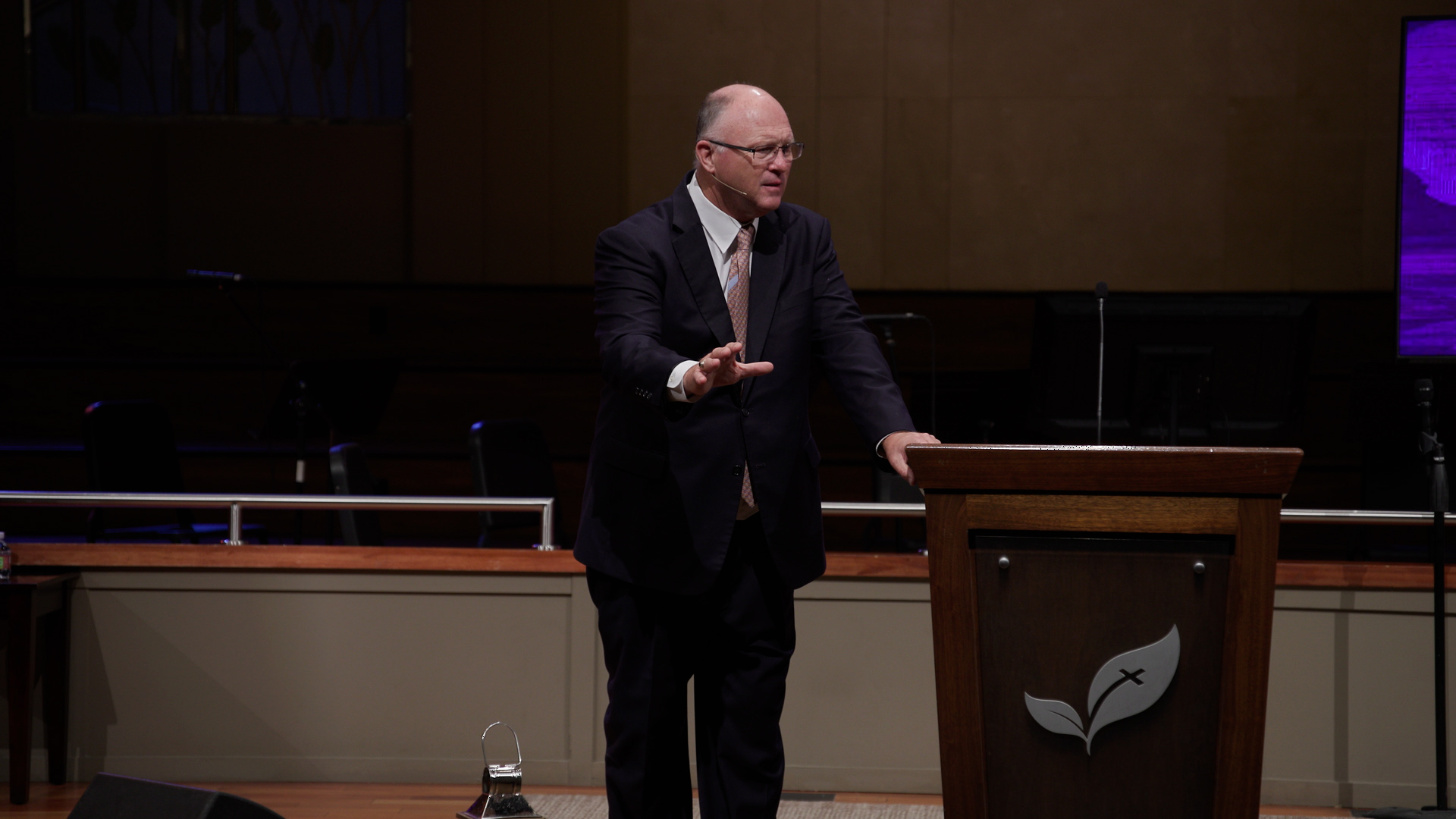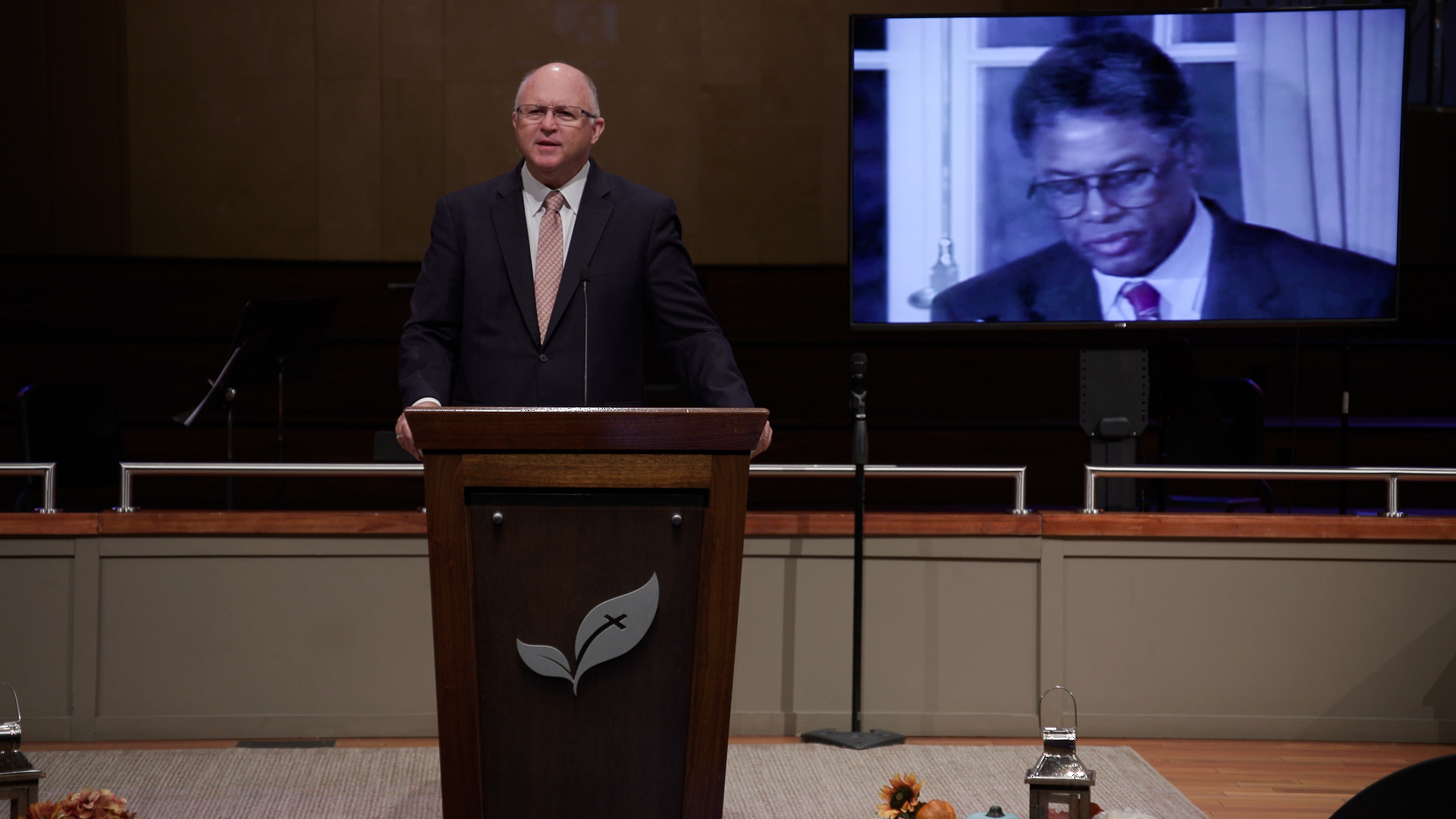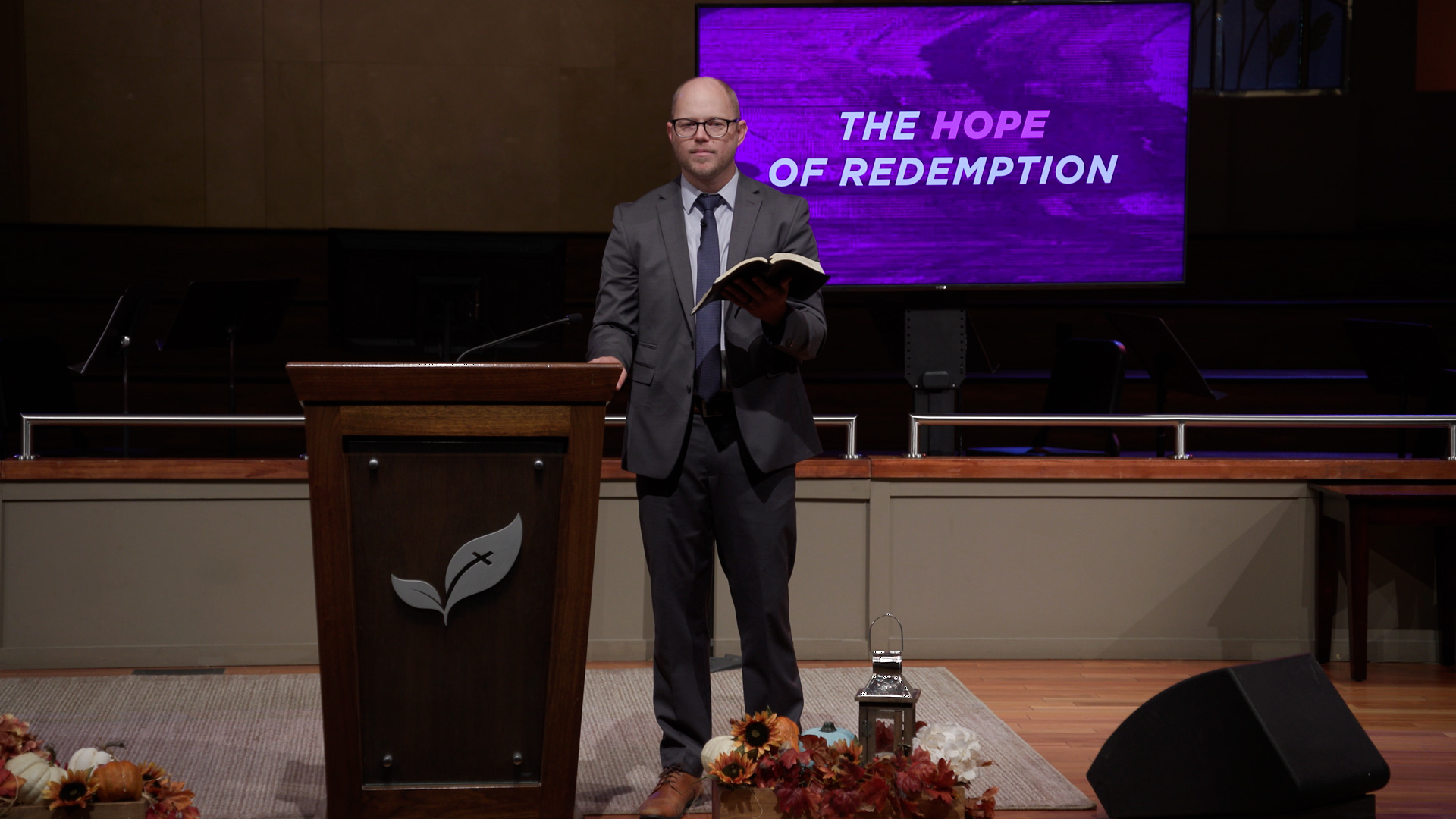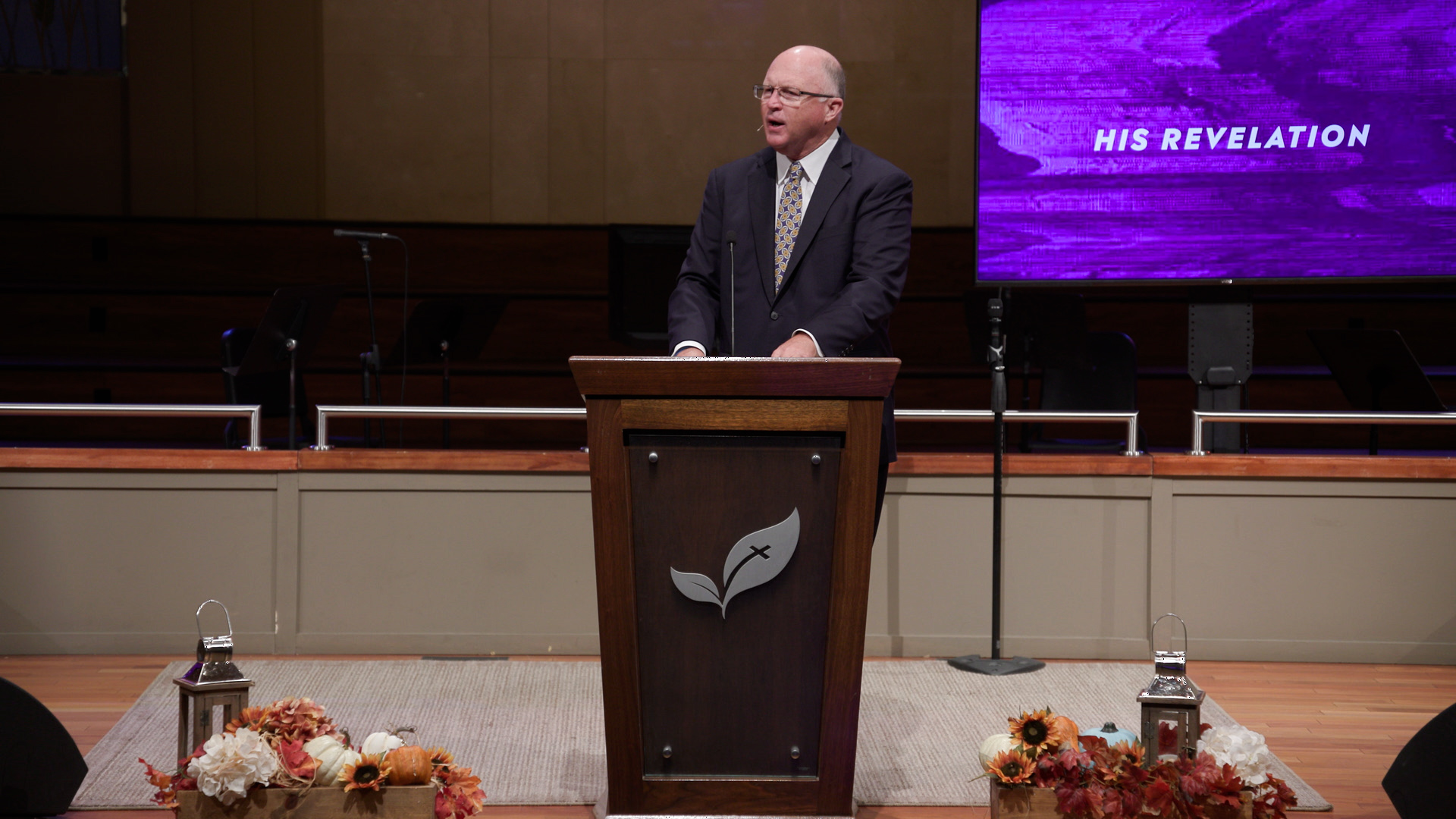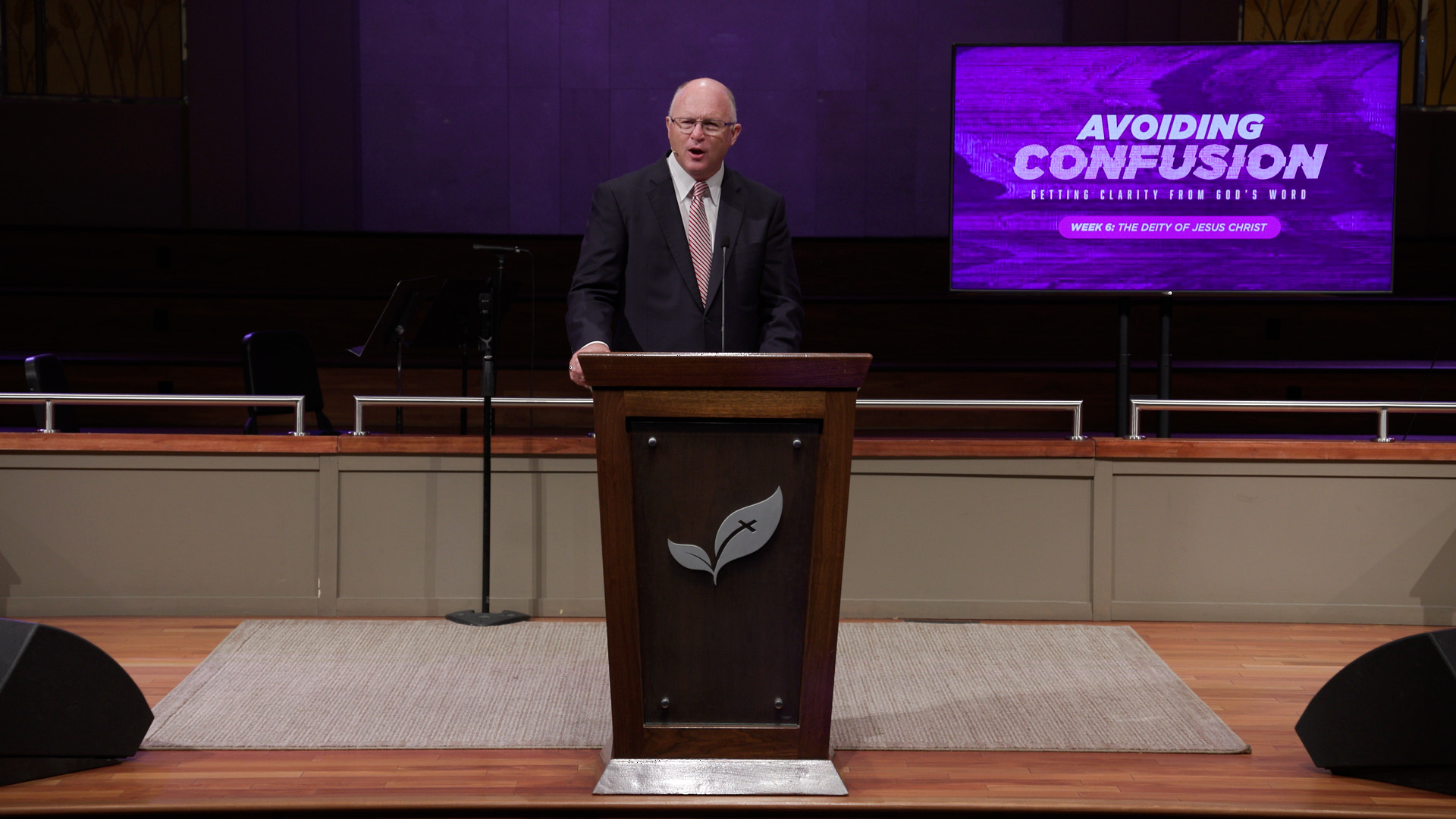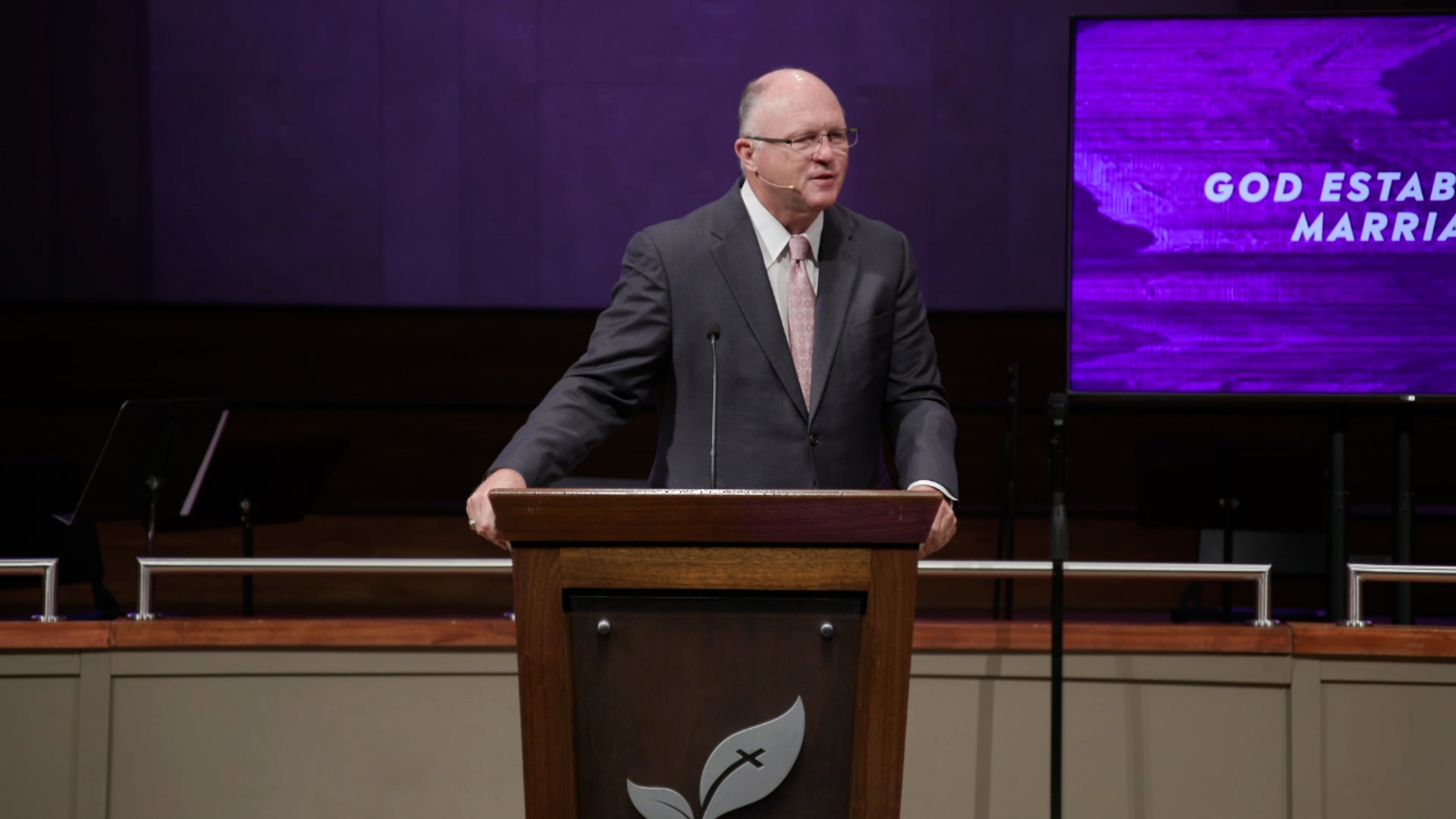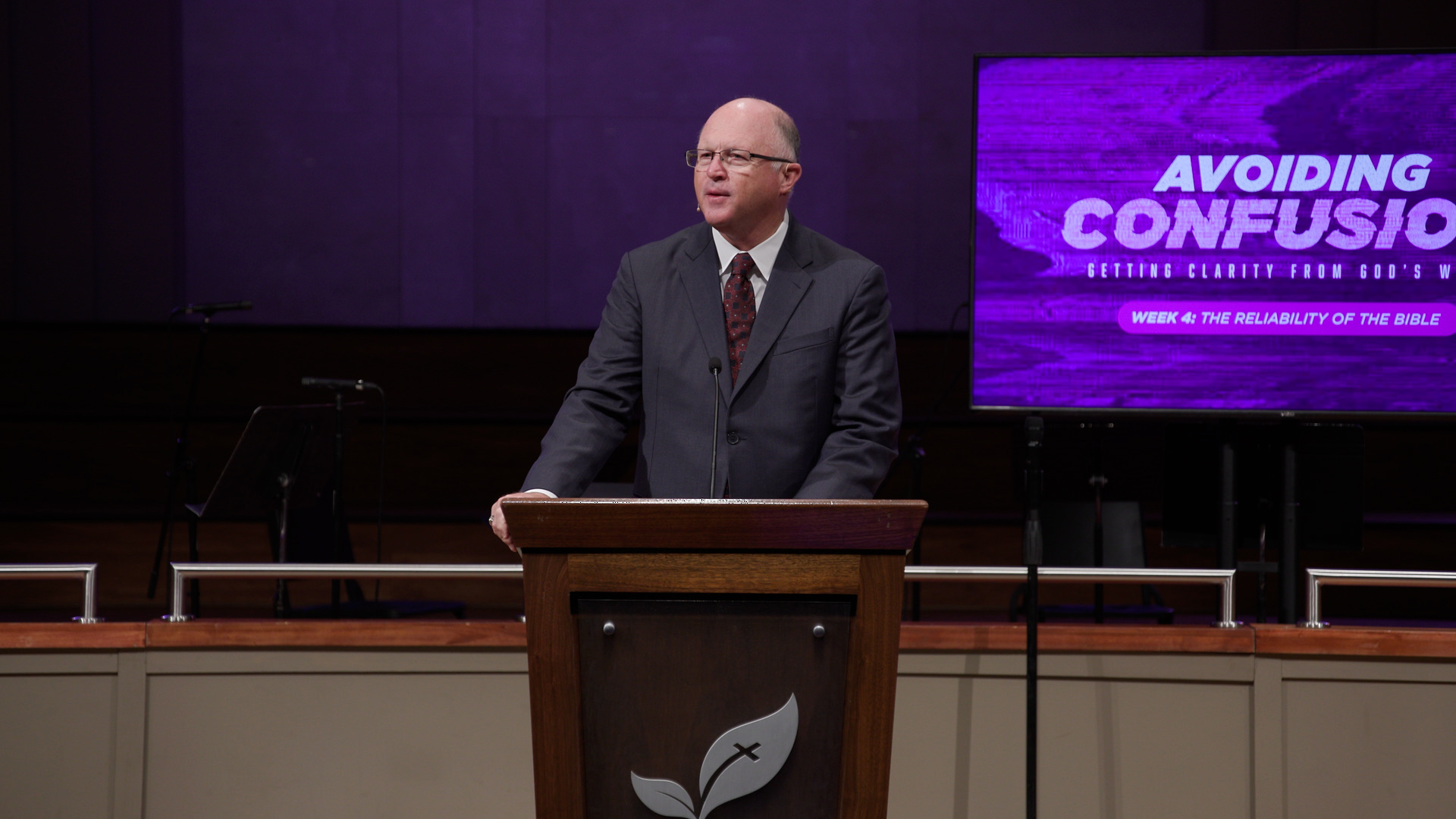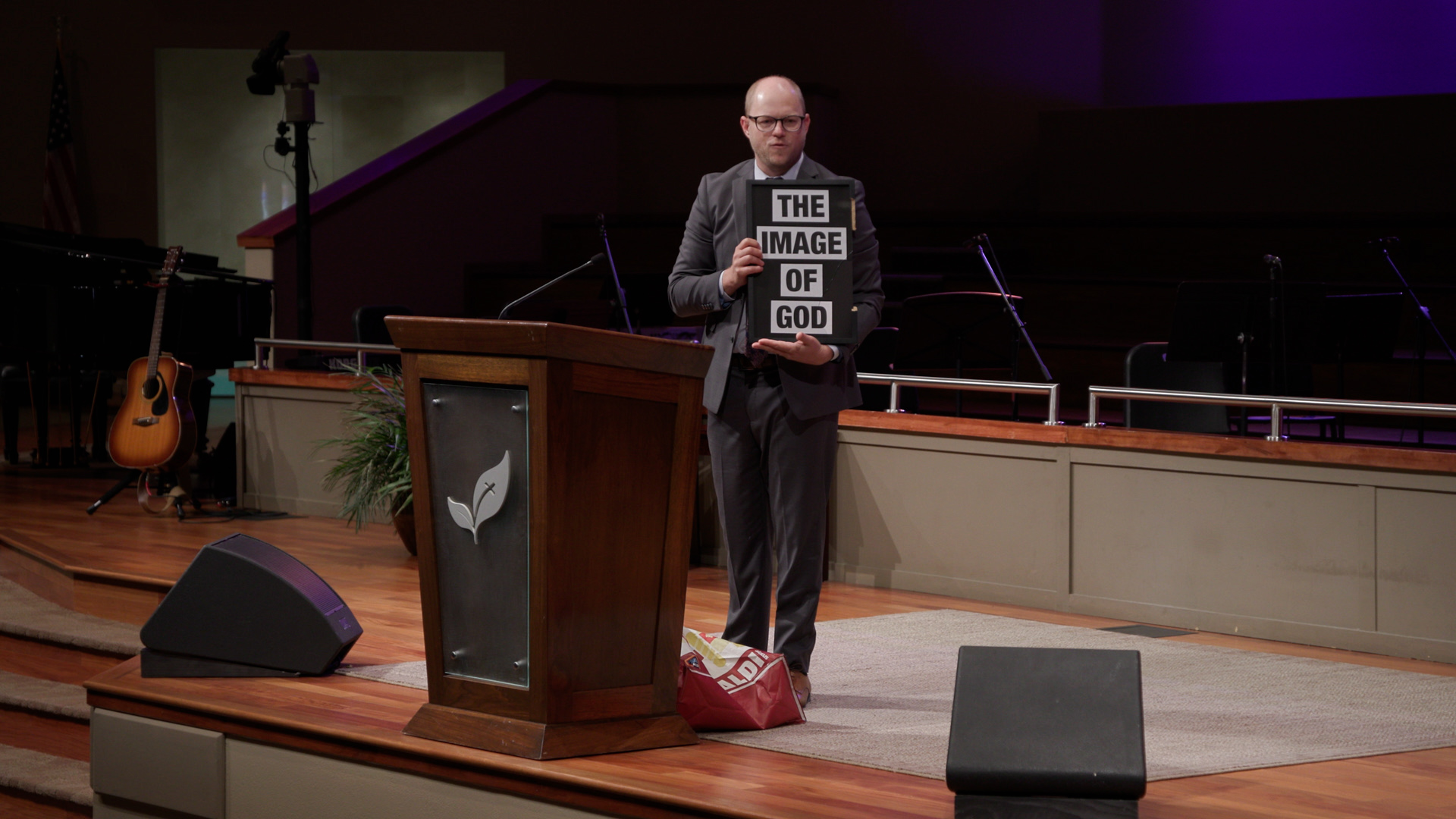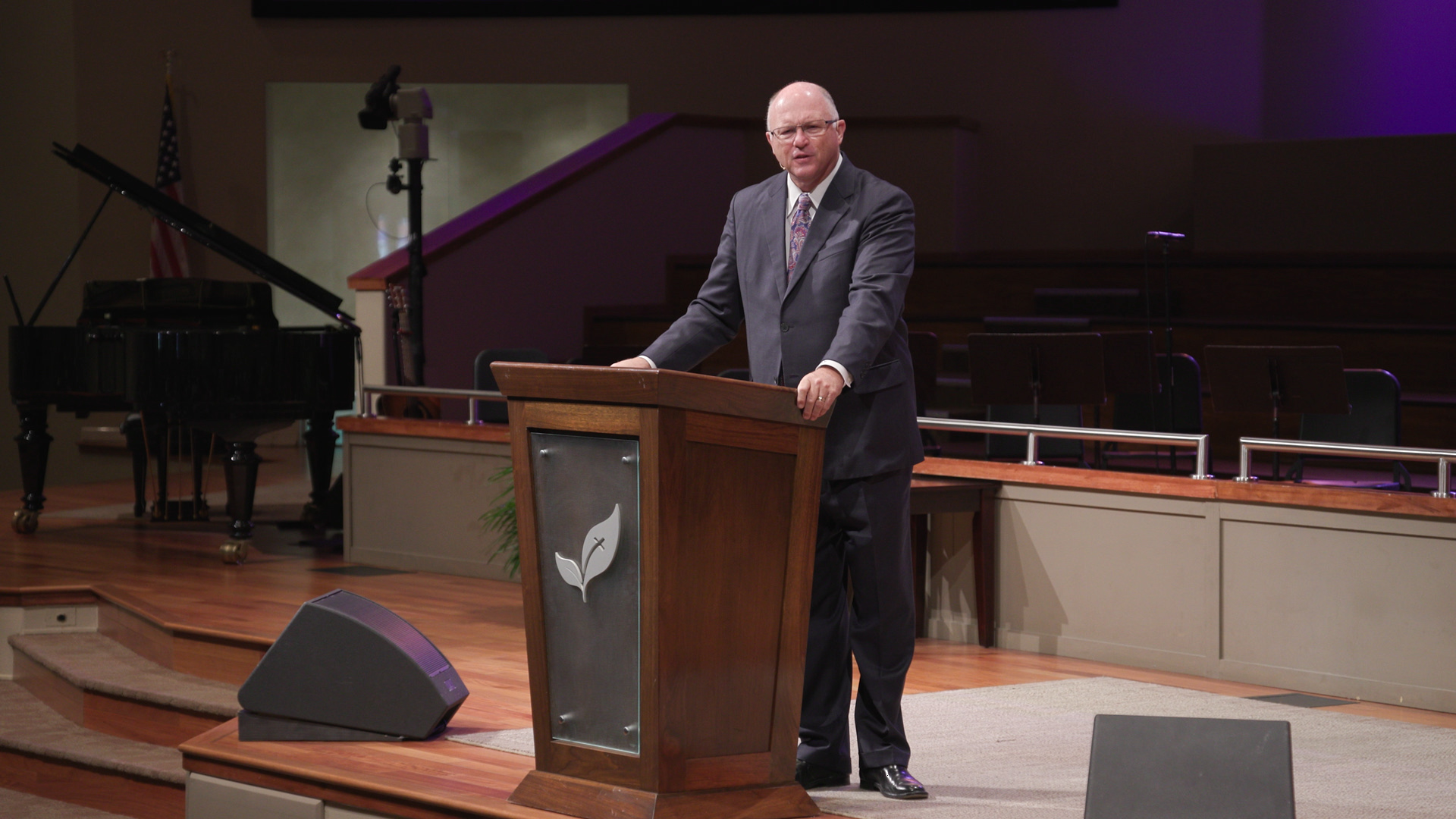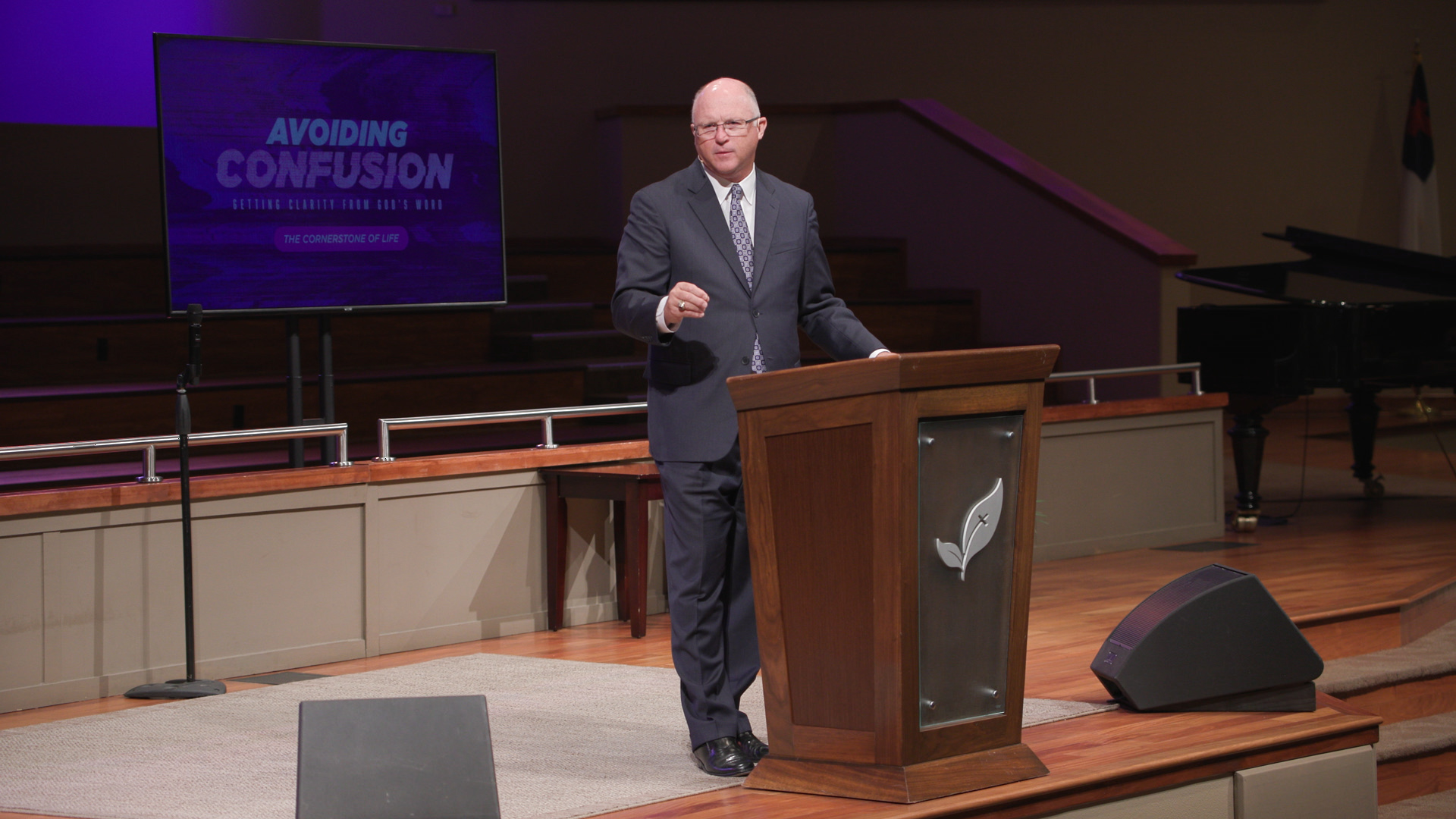Take your Bible, turn, if you would, to 2 Timothy chapter 3, as we continue our series "Avoiding the Confusion." There's lots of confusion out in our world and we want to keep it out there and stay focused on Christ in our hearts and in our church. And how can you avoid the confusion? Well, the way to do that is to have a biblical worldview. And last week we had a message from Larry our youth pastor, our son. Larry gave a great message – I watched it online – on "Why the Bible Speaks Against Abortion, and Where Life Begins." And thank the Lord for this series that is just helping us to look at current events in the light of scripture.
And in light of that, we're going to look at the scriptures themselves today, and I'm going to bring a message this morning on "The Reliability of the Bible." So let's stand together as we turn to 2 Timothy chapter 3. If we're going to be studying our biblical worldview, then we want to have confidence in the word itself. And today I want you to follow with me as I read just three verses.
Today's message will be a little similar to last week: a lot of facts and slides and some different background to the scripture. And so I encourage you to download the outlines. I think you can do that even now if you're really good at tech. You can go to the church website and find it. But you can do that on Fridays when we send you the email as well. If you want the outline for this morning, let me see here, I think they flashed it up here for me. You can find it at lancasterbaptist.org and follow along that way. But however you choose to follow make sure that you get the most out of this.
Second Timothy 3:15, "And that from a child thou hast known the holy scriptures, which are able to make thee wise unto salvation through faith which is in Christ Jesus. All scripture is given by inspiration of God, and is profitable for doctrine, for reproof, for correction, for instruction in righteousness: that the man of God may be perfect, thoroughly furnished unto all good works." Let us pray.
Father, we thank you that we have a lens through which we can view the events of this world, and that is the lens of scripture, and that it is a reliable lens, and that it informs us and guides us each and every day. Help us to learn and to love your word more because of our time here this morning. And I pray and ask this in Jesus' name. Amen. You may be seated.
Well, why do Christians say, "The Bible is the word of God"? And what do we mean when we say, "The Bible is the word of God"? I would submit to you this morning that if the Bible informs our worldview, then we certainly should learn more about the origins and why we would trust in this book as the lamp to our feet and the light to our path.
Now make no mistake, Satan has fought the Bible. Since the very beginning he has fought every word of God. In fact, the Bible tells us in Genesis 3:1 that Satan came to the woman when he was tempting her, and he said, "Yea, hath God said, 'Thou shalt not eat out of every tree of the garden?'" And I want you to think about that phrase: "Hath God said?" And that's what Satan has been saying since the beginning of time: "Is that really what God said? Is that really true? There's so many versions, how can we know the Bible is really the word of God?"
And there have been attempts throughout the centuries to question God's word. And even with so called higher criticism coming from Europe. At the end of the twentieth century, there was an impact of theological liberalism that had really affected every mainline denomination, and there were beginning to be seminaries that were questioning passages of the word of God, miracles in the word of God, and books of the Bible.
In recent days we have seen secularization on the rise. As we saw a few weeks ago, humanism and secularization questioning not only the existence of God, but the very word of God itself. And sadly, many people sitting in the pews of gospel-preaching churches have been unwittingly lead to hold to false views about the Bible and about God because there's such a pervasive influence of secularism coming into our minds each and every day.
One author, F. F. Bruce, said concerning the Bible in the New Testament in particular, "The evidence for our New Testament writings is ever so much greater than the evidence for many writings of the classical authors, the authenticity of which no one dreams of questioning. And if the New Testament were a collection of secular writings, their authenticity would generally be regarded as beyond all doubt."
It is a curious fact that historians have often been much readier to trust the New Testament than have many theologians. Many so called theologians enter into the conversation with the idea of making themselves the authority over the Bible. But we enter into the conversation realizing that we are under the authority of the Bible, that God's word is the authority in our lives. And while many insist on denying the historicity or the veracity of scriptures, we believe at Lancaster Baptist Church that the Bible is the reliable word of God.
I heard about a lady one time that was on an airplane, and she was flying along next to this gentleman, and she had her Bible out. She always got nervous flying, so she would get her Bible out and try to comfort her heart a little bit reading the scriptures. And the man next to her said, "Do you really believe everything in that book? I mean, do you actually believe that that contains God's word?" And the woman said, "Well, of course I do."
And the man said, "Well, what about that guy that got swallowed up by the whale?" She said, "Oh, you mean Jonah. You're talking about Jonah. Yes, I believe the account of Jonah." And he said, "Well, how long do you suppose that he was in that whale?" She said, "Well, I don't know exactly." She said, "I have a pretty good idea, but I'll ask him for sure when I get to heaven." And he said to the lady, "Well, what are you going to do if he isn't in heaven?" She said, "Well, then you can ask him." Now that's a lady who has confidence in the word of God.
So why do people put their confidence in the word of God? I want you to notice in verse 16 the Bible says, "All scripture is given by inspiration of God," and I want you to learn with me first of all this morning about the reliability of the Bible, the reliability of the Bible, that the Bible contains the inspired words of God: "All scripture is given by inspiration of God."
The word "inspiration" is an interesting word, the Greek word theopneustos, which means a God-breathed book. The Bible is given of the Holy Spirit. Just as God breathed and Adam became a living soul, God breathed into his words and they are alive, and they have been giving life to men who believe on the Lord Jesus Christ. And so the word "inspire" means to breath into. So we believe the Bible to be a God-breathed book.
John 6:63 says, "The spirit quickeneth; the flesh profiteth nothing: the words that I speak unto you, they are spirit, and they are life." Hebrews 4:12, "For the word of God is quick," – meaning alive – "and powerful, and sharper than any two-edged sword, piercing even to the dividing asunder of soul and spirit, and of the joints and marrow, and it is a discerner of the thoughts and intents of the heart."
The Bible is a living book. God breathed his words into this human authored who penned those words. They were not the words of those men, but of God himself. And these words are alive. I mean, when we hear preaching and when we read the word of God, the thoughts that are penetrating our heart, and the words that our heart are convicting, like a sword cutting at times and discerning our own thoughts.
The Bible tells us in 1 Peter 1:23 that, "We are born again, not of corruptible seed, but of incorruptible, by the word of God, which abideth forever." And so the Bible is a living word. It is an incorruptible seed. It is a seed that will never die. It produces fruit. It brings new life. And so we see that God's word, as an inspired book from a divine author, is given to us.
Now the divine author is God's Holy Spirit, God himself. But then it comes through human writers. And this is very interesting because some people say, "Well, the Bible is just man's words, just a bunch of guys' opinions." But listen to what the Bible says in 2 Peter 1:21. It says, "For the prophecy came not in old time by the will of man: but holy men of God spake as they were moved by the Holy Ghost."
All right, so let's think of this now. The prophecy came not in old time by the will of man. It was not man willing and saying, "All right, I'm just going to write what I want to write." But the Bible teaches us that it came of holy men of God as they were moved by the Holy Ghost. Again, God is the author, these men were simply writing out the God-breathed words that were given to them.
The Bible claims that the Holy Spirit moved men to write what he wanted; yet many times they wrote from their context, from their styles, but the words were the very words of God. The Bible was written by almost forty human authors from all different backgrounds and generations over a period of 1,500 years; yet the Bible has a unity and a continuity that only one writer could have brought throughout, and that, of course, is because God is the author of this book.
David, for example, claimed that God gave him the words as he wrote. And the Bible teaches us in 2 Samuel 23:2, "The Spirit of the Lord spake by me, and his word was in my tongue." And many times the prophets of the Old Testament would say, "Thus saith the Lord." This was the message they were giving from God. The writers expressed that they were aware, that the scripture was coming directly from God.
Henry Morris wrote years ago, "There are, in fact, over 320 quotations from the Old Testament recorded in the New Testament, as well as over 1,000 clear and definite references to it. Always the context indicates the belief of the speaker or writer, that he was referring to the authoritative word of God whenever he made such a quotation or such a reference." So whenever you find these references in the New Testament to the Old Testament, they were indicating what the scriptures said, what God said; again, not their own opinion. And so we have the Bible from a divine author, through human writers, coming down to all of us as a needy people who need the direction that comes from God himself. These are God's inspired, God-breathed words.
But not only do we see the scriptures as being inspired, but secondly, we see them as being inerrant. The word of God provides inerrant facts, facts that are without error. And I think about the uniqueness of scripture being without error. The Bible, for example, was not written simply as a history book or simply as a scientific book. But when you touch upon those subjects in the Bible you'll find the accuracy of the Bible so wonderful on each and every occasion. It is the only book of antiquity that gives an account of the special creation whereas God created all things out of nothing. It is unique to the Bible, this wonderful story of our creation.
The Bible is the only book that gives a continual historical record from the first man until the present day. The Bible is the only religious book containing detailed prophecies by the hundreds of things to come, and so many of them having already been fulfilled. And so when we look to the word of God we see this as inerrant word, and it gives us many accurate descriptions.
For example, regarding history, we have the accurate record of history from the Bible. The Bible tells us about Pharaoh, and the accounting of the Egyptians, slavery of the children of Israel, and all of the accounting of the making of the bricks out of mud and straw. And several years ago, maybe 20 years ago or so, I was able to visit at the British Museum, and I was just thrilled to see some of the actual bricks taken from Egypt with an actual stamp of King Ramses II in the brick. And so many archeological studies have shown the Bible to be absolutely infallible. And what a blessing.
I think of the existence of the Hittites, a group of people mentioned in the Bible. And for many years the critics attacked and said, "There were never such a people. There were never such a people as the Hittites." And yet archeologists discovered the Hittite Empire. And much of the Hittite Empire has testimonials there as well in the British Museum. It wasn't found until many hundreds of years after the record of scripture. But the Bible was right all the time.
There's the existence of the historical figure found in Daniel chapter 5, Belshazzar. And again, many times critics would say, "There is no such individual. There's no such leadership." And yet again you can find the clay tablets that were discovered showing that the scriptural account was right all the time.
And so whenever the Bible touches upon history, whether we have fully understood it yet archeologically or not, as time has given evidence, the word of God is historically accurate. It is scientifically accurate. The design of our earth is described in the Bible. In Isaiah 40:22, we read, "It is he that sitteth upon the circle of the earth." And many of you know this, but for hundreds of years men taught that the world was flat. And yet all the while, the Bible tells us that it is a sphere, the circle of the earth.
The Bible teaches us about gravity. Job 26:7, "He stretcheth out the north over the empty place, and hangeth the earth upon nothing." And we see God teaching us exactly concerning the gravitational pull of our earth and of the system in which we live. And so we have inspired words in the Bible. We have inerrant words. When the Bible does speak about history or science, the Bible gives us the accurate record.
But then I want you to notice that we have an infallible truth in our hands this morning. We have an infallible truth in our hands. Evidence of the infallibility of the scripture can often be best seen when studying the prophecy of the Bible. Henry Morris said, "One of the strong objective evidences of biblical inspiration is the phenomenon of fulfilled prophecy." The Bible is essentially unique among the religious books of mankind in this respect. Some of them contain a few vague forecasts, but nothing comparable to the vast number of specific prophecies found in the Bible. In other words, some false religions try to make some vague forecast of what may come.
But the Bible has given over and over again specific prophecies. I think specifically of the Lord Jesus himself. The Bible prophesies the time of the birth of the Lord Jesus. And when you study Daniel's prophecy in Daniel 9:25-26, and as you study out the meaning there of the 69th week ending with Christ's death, and you begin to study the timing of when Christ died, and then back that away from the seven-year period, you'll find that Jesus Christ's birth was prophesied within just a few years span of exactly when he came.
The mode of Christ's birth was prophesied in Isaiah 7:14, "Therefore the Lord himself shall give you a sign; behold, a virgin shall conceive, and bear a son, and his name shall be called Immanuel." And the place of the birth of Jesus was prophesied. Micah 5:2, " But thou, Bethlehem Ephratah, though thou be little among the thousands of Judah, yet out of thee shall come forth unto me that is to be the ruler of Israel; whose goings forth have been from of old, from everlasting."
What an amazing book that 700 years prior to the coming of Christ we read about the timing of his coming; the way that he would come, by way of the virgin birth; and the place where he would be born, Bethlehem, just a tiny speck on God's earth, just a little tiny village; and yet God pinpointed and predicted accurately through his word when Jesus would be born. We could speak for hours on the reliability of the Bible, but I share these few illustrations simply to say that when God tells us that all scripture is given by inspiration of God, that this is a God-breathed book, it is supernatural, it is high above all the literature and all the opinions that this world can offer.
But I want you to think about something secondarily with me this morning, and that is the durability of the Bible. We see the reliability of the Bible, but I want you to think about the durability of the Bible, and I want you to notice the Bible says in verse 15 these words: "And that from a child thou hast known the holy scriptures."
Now Paul is reminding Timothy here that he had known the scriptures from his childhood. That could only be true because they had been kept throughout the Old Testament generations. In other words, the scriptures are referring to the Old Testament scriptures that Timothy held and understood and studied, and he says, "Timothy, you've known these scriptures from the time that you were a child."
By the way, thank God for mothers and fathers who read the Bible to their children. Don't leave Christian education to the church or to the school, but be sure you're reading God's word and talking about God's word in your home. And Paul said, "Timothy, you've learned this from your mother and your grandmother throughout all of these years." So the Old Testament had been brought to that point, and then the New Testament also placed into the Canon.
But how do we understand the durability of the scripture? Well, I want you to notice this morning that the words of God have been preserved. God's word has been preserved. You see, God has promised that through the Old Testament era and all the way through until the very last verses of Revelation, he says, "I don't want you to add to or subtract from this. This is my word." And he said, "I want you to know that this is a durable word." Deuteronomy 29:29 says, "The secret things belong unto the Lord our God: but those things which are revealed belong unto us and our children forever, that we may do all the words of this law."
Psalm 12:6, "The words of the Lord are pure: and as silver tried in a furnace of earth, purified seven times. Thou shalt keep them, O Lord, thou shalt preserve them from one generation to another." So God says, "I'm going to make sure, just as sure as the early, early people had my word and had my revelation, from the time of Moses and the law all the way until this present day, that you have my word in your hands available to you." Isaiah 40:8, "The grass withereth, the flower fadeth: but the word of our God shall stand forever." And when you compare what Isaiah wrote around 700 BC and what Peter quotes almost 800 years later, you can see the continuity of the scripture.
I just read you from Isaiah. Listen to what Peter said in 1 Peter 1:24, "For all flesh is as grass, and all the glory of man as the flower of grass. The grass withereth, and the flower thereof falleth away: but the word of the Lord endureth forever." Isaiah said it, Peter said it 800 years later. We see the continuity, the durability of the Bible.
Matthew 5:18, "For verily I say unto you, till heaven and earth pass, one jot or one tittle shall in no wise pass from the law, till all be fulfilled." God said, "I'm not going to let any smallest part of my scripture be extracted; I'll keep it for you. It will be reliable for you." Not only does God preserve his word in the text, but he gives to us copies that we might have in our hand and in our possession. And so the word is preserved, and the words are preserved.
But notice, secondly, that the Bible manuscripts have been preserved. Now we have, I believe, in our hands this morning the preserved word of God. And I have great confidence in the King James Bible because of the text from which it is given, and because of the process whereby God has given us this wonderful book. But when we say God's word is preserved we're speaking of the fact that, yes, he has held it together and given it to us, but also that there are manuscripts. And some say, "Well, where are the original?" Well, let me say to you that I'm afraid if we had all of the originals people might worship the originals rather than the author of those originals.
But I will tell you that there is much in the way of manuscript evidence that guides and directs and reminds us that we have the very word of God. And I'm not an expert in manuscript evidence, but let me share a few thoughts with you. The overwhelming physical manuscripts that exist today are astounding to us because they are handwritten, they are found in vellum and papyrus and placed in various places around the world as a testament to the early faith of the scribes and the believers who loved the word of God. No other ancient books or writings have more extent evidence regarding their existence and their history than the Bible itself.
Bruce Metzger from Princeton years ago said, "If you take the 20,000 lines of the New Testament, it is safe for any scholar to say there's at least 99.6 percent accuracy. No ancient document, none has the kind of documentary support that the Bible has, over 5,000 documents."
Even in Time magazine in 1988, one author wrote in his article, "Religion: Who was Jesus?" and he said, "The one thing that we cannot deny the Christian is the documentation that is available. Across the centuries nothing in ancient literature – Homer or the Gallic Wars of Caesar – nothing matches the Bible." So when you've got this kind of documentation, this kind of accuracy, you have very compelling evidence. And I'm so thankful that we have a Bible that's inspired, a Bible that's preserved, and that the manuscript evidence that exists shows to us the authority, the accuracy regarding the scriptures that we preach.
I've had the privilege of seeing some of these ancient copies in my lifetime. In the Bodmer Library in Geneva, Switzerland, Martin Bodmer had purchased some of these ancient books and bibles and manuscripts; and there in his library you can see a Gutenberg Bible, of course, one of the first bibles printed. And really, God used the printing press to spur on hearts with respect to a love for God and for souls being saved. But beyond that, in this particular library, there are several manuscripts by titles P66, P72, and P75; and these are some of the earliest Christian writings. And it was a thrill for me to see some of these writings. P66 known as the Bodmer Papyrus II. It dates to 200 AD. The codex is just one century removed from the original text of the Bible, and it contains John 1:1-13 and the opening words of verse 14.
On the next one, we were able to see the earliest copy of the book of Jude and the epistles of Peter. Again, just less than a century removed from those that sometimes people say, "Where are the original?" My heart was still thrilled to see those that were really so close to the early church and had been handwritten and were discovered in various digs and archeological digs in the Middle East. These books seem to have been copied by the same scribe that were in the Bodmer Library, and the handwriting is signed to those times.
In another picture here, P75, the scholars date between AD 175 and 200, is the earliest known copy of the gospel of Luke. And again, what a thrill it was to stand there and see something penned out in 175, the earliest in the world known copy of the gospel of Luke. And what we find in these early manuscripts is that they are in exact concordance to the word that we preach even to this very day. And so it's a blessing to know that God's book is supernatural. I believe in the word of God without the manuscripts. But the manuscripts, they're not simply saying that the Bible might be the word of God, they're confirming the Bible is the very word of God.
Another library in Dublin, Ireland is the Chester Beatty Library. Chester Beatty began purchasing these artifacts. He was a very successful British businessman who made this his hobby. In the Chester Beatty Library there is a document known as P45. It's a part of a codex of Matthew, Mark, Luke, John, and the book of Acts. And again, these are dating back to 200-250 AD. There's one known as P46, it contains Romans; it contains portions of Hebrews, 1 and 2 Corinthians, Ephesians, Galatians, Philippians.
The other, P47, contains the oldest known text of the book of the Revelation. And all of these early Papyri are housed at the Chester Beatty Library. I was able many years ago to see them with my own eyes. They've troubled some textual critics because they favor the Byzantine or the Textus Receptus family. That thrilled me to find that out. Those would be in the lineage of our King James Bible. And so it's just amazing to study and to see that God's word not only declares itself to be infallible, but when you find those early manuscripts, you find that there's continuity in what we have been able to have in our very hands today. And I'm thankful for that tremendous heritage that we have. The biblical heritage that we have even to this day this morning.
Over at Cambridge University there's another codex that dates back to the 400s, and this particular codex contains the Gospels and Acts in both Greek and Latin; and the only book that is complete is the gospel of Luke. And the codex was acquired by the theologian Theodore Beza in 1562, and he gifted to the university in 1581. And again, the reason I mention these is because of the accuracy and the continuity to the very Bible that's in our hands this morning.
And so we see that the words are preserved. We see that the manuscripts are provided and showing continuity. And then I want you to see, thirdly, that the Bible is indestructible. No matter what tyrant, no matter what dictator tried to get rid of the Bible, the Bible still stands for us today.
Josh McDowell in his excellent work Evidence That Demands a Verdict said, "The Bible has withstood vicious attacks of its enemies as no other book." Many have tried to burn it, ban it and outlaw it from the days of Roman emperors to the present day communist-dominated countries. Some of the examples we've seen in history: In 303 Diocletian issued an edict to stop Christians from worshiping and to destroy their scriptures. And this was something that was common. And the burning of scriptures was common, and that's why many of the originals are not found because they would come in and they would murder the Christians and they would burn their Bibles, Diocletian amongst other Roman emperors.
Twenty-five years later, however, Constantine ordered Eusebius to have 50 copies of the Bible made and distributed throughout the Roman Empire. And you can see the attacks on the Bible, but you can see God sustaining the Bible throughout history. William Tyndale, one of the most famous names in Bible translation, he translated the Bible into English while running from hostile authorities. Amazing stories about William Tyndale and how he shipped copies over to Belgium and how they were hidden there, and then how they were found by at times the Roman Catholic Church or the government. And they were destroyed many times and burned. But he kept translating the word of God until he was martyred in 1536. His ministry, however, lived on, and the Tyndale Bible became a major source in the lineage of the King James Bible from which I preach this morning.
And what I'm simply saying here is that whenever there was an attempt to burn the Bibles, to get rid of the Bibles, there was another great moving of God to translate and to give scriptures into the language of the common people and to distribute the Bible. And so the Bible is amazing in its reliability. It is amazing in its durability. And then I want you to see finally this morning, the Bible is God's word because of the capability of the Bible. I want you to think about the capability of the Bible this morning with me.
Notice in verse 16 again, the Bible says, "All scripture is given by inspiration of God, and is profitable for doctrine, for reproof, for correction, for instruction in righteousness: that the man of God may be perfect, thoroughly furnished unto all good works." Now when I think about the capability of the Bible I think, first of all, about the authentic power of the Bible. I think about my own life, how God saved me through the words of this Bible, how he brought new life to me through this message, how he has so many times convicted and changed and how he's helped me to become a better husband or father, how he's helped me to understand circumstances and difficulties in life just by reading this book.
This book is alive and it speaks to your heart as no other book can. It is authentic in its power. A. W. Tozer said, "An honest man with an open Bible and a pad and pencil is sure to find out what's wrong with him very quickly, and then he'll find out how to make it right very quickly." That's what it tells us it will do.
Notice that in verse 16. It will give us doctrine, reproof, correction, and instruction. Doctrine is a set of beliefs. God says, "I'm going to give you a set of beliefs. I'm going to give you reproof when you need it. I'm going to give you help when you need it." We'll see this in a moment. But it's authentic in its power.
The Bible teaches us that it reveals the thoughts and intents of the heart. Thomas Brooks said, "It is the very drift and design of the whole scripture to bring souls first to an acquaintance with Christ, and then to an acceptance of Christ, and then to an assurance in their walk with Christ. You show me a Christian that gets away from the Bible, they lose assurance. You show me a Christian that stops reading, and they're not faithful in church; that's why this pandemic has been so concerning to me as a pastor. It's disrupting our normal schedule of things, including our times in church and so forth. That's why we're trying so passionately to be faithful because you show me a Christian that gets away from teaching, preaching and studying for lengths of time, and there's not a change that's needed in his life that comes through the word of God. And so if it authentic in its power.
But it's authoritative in its principles. And I want you to study those principles. Just quickly I'll mention them. First of all, doctrine. Doctrine shows us what is right. I was speaking this week with a very well-known Christian leader and I was speaking to him about some of the history of recent liberalism that affecting churches and false theories and philosophies that are seen in mainline denominations, and I just asked him the question, I said, "How have you processed through a lot of the changes that you've needed to make over the years?" and he said, "There hasn't been a process, I've just gone to the Bible and done the right thing each time." In other words, what he was saying is the Bible gives us the doctrinal principles to live our lives by. It gives us those ancient landmarks.
So, for example, the Bible says, "Forsake not the assembling." I don't have to get up on Sunday mornings and kind of figure all that out. As soon as I sense the Lord leading – and in these days we've had those with underlying conditions and we're sensitive to that, and some that are watching at lbclive.tv. But all of us have had to kind of say, "Lord, this is what you're saying, and I want to obey you as best I can in the culture in which I live."
The Bible tells me that I'm to honor my wife and to love her as Christ loved the church. I don't have to decide that every day. I don't have to feel that every day. It's a doctrine that God has given to me. And I don't have to decide every day who Jesus is, it's a doctrine that has been given to me. And I don't have to decide every day whether or not I'm going to read the Bible, it's a doctrine that has been given to me.
I could go on with it, but the scriptures give us authoritative principles. And the word here is "doctrine"; and one of the great needs in the lives of so many in this room today is to become grounded in some doctrines so that our Christian life is not so wishy-washy, so back-and-forth, and so that by doctrinal conviction we will live the Christian life, you see. So he gives us doctrine.
Then notice what it says. It says he gives us reproof. Now, ladies, I'm going to tell you something. I believe that God's word will make your husband a better man of God quicker than you can. And a lot of times ladies will say, "My husband needs this, and my husband needs that, and he probably need that and ten times more." But what we as husbands really need is to get into this book and to get to church and let God's word reprove us, because when we're wrong, the Bible's going to tell us we're wrong.
By the way, that's why some people stay away from church. They don't want that preacher telling them what to do. Well listen, I don't have any desire to tell you what to do. I learned a long time ago a man persuaded against his will is – what? – unpersuaded still.
But I do have a desire for you to let God's word tell you what to do. And if God wants to reprove your thought life, and if God wants to reprove your action in your home, and if God wants to reprove the management of your life in some way, then he'll do that through his word. That's what God's word can do, and he does it in such a wonderful way.
It gives us doctrine, reproof. Notice the next word: "correction." It shows us how to get right. God's word does not just condemn us, but it corrects us and it helps us to know how to do better. And then the next word is "instruction." It shows us how to stay right. God says, "I'm going to mentor you. I'm going to guide you." Someone says, "I need a life coach." Start with the Bible. "I need a mentor." Start with the Bible. God said, "I'm going to give you the guidance and the instruction that you need along the way."
And so we see the word of God containing authentic power and containing authoritative principles. And then it contains a perfect process for our lives. Notice in verse 17 as we close, "that the man of God may be perfect, thoroughly furnished unto all good works."
Now let me say that every one of us should desire to be men and women of God. And the word "perfect" means mature; and what God is saying to us is that with his word we can become mature. We can grow through his word, "that the man of God may be perfect, thoroughly furnished unto all good works," ready to do the work that God has called us to do. Dwight Moody said, "The scriptures were not given to increase our knowledge, but to change our lives." And that's what God's word can do. And that's what God's word can do this morning, it can touch our lives and convict us and change us today.
And so we see this morning the reliability of the scriptures. It is an infallible, inerrant, and preserved word. We see the durability of the scriptures, that throughout all of these centuries God has maintained his word. And, yes, he's given us manuscripts. But our faith and confidence is not found in a manuscript, it is found in the script, the very word of God, and the promise that he said, "I'm going to preserve my word." That's enough for me. God said he would preserve it, and he has; and we trust him today.
And so we see the reliability of the Bible, the durability of the Bible, and the capability of the Bible. This book is the mind of God. It shows us the state of man. It shows us the way of salvation. It shows the doom of sinners and the happiness of the believers. Its doctrines are holy. Its precepts are binding. Its histories are true. Its decisions are immutable. Read it to be wise, believe it to be safe, practice it to be holy, and put your trust in the Bible, the very word of God.
I like what President Ronald Reagan said about the Bible. He said, "Within the covers of one single book, the Bible, are all the answers to all the problems that face us today, if we would only read and believe." And I agree. All the answers to the problems that face us today, if we would only read and believe. Someone's burdened; bear their burden. Someone feels neglected; love your neighbor. Someone has a need; help them in their time of need.
Listen, God's word has given us the moral concepts from which our very government was founded upon, and we must follow the word of God even in this difficult day. But there is no greater way that the Bible changes lives than when the word of God is found in the heart of a man who turns to Jesus Christ as his Savior. You see, the way that somebody is saved is by the hearing of the word of God. "Faith cometh by hearing, and hearing by" – what? – "the word of God."
No one is saved without the word of God. Salvation is not, "I saw a vision at my bed." Salvation is not, "I turned over a leaf, a new leaf." Salvation is not, "It was real dark, and then a light came on." Salvation is always in response to the word of God. "Faith cometh by hearing, and hearing by the word of God." And that's why the Bible says, "How can they hear without a preacher? And how can he preach except he be sent?" And God says, "I want my word to be preached."
We must hear the word of God, but we also must have the work of the Holy Spirit. So the Bible tells us, "That which is born of the flesh is flesh, and that which is born of the Spirit is spirit." And when the word of God is heard and the Spirit of God is working, someone's life can be changed forever, "being born again, not of corruptible seed, but of incorruptible by the word of God which liveth and abideth forever."
And, friend, when you hear the word of God and you understand from the word of God that you are a sinner that falls short, just like I am, just like everyone that has ever lived, and when you realize you're a sinner and that Christ died for your sin, and you turn to Christ to be your Savior, at that very moment the incorruptible seed of the word, the message of the word, the gospel of Christ, it finds lodging place in your heart, and you put faith in Jesus Christ, and you are saved at that very moment. How? Because of the message of the word of God. And that's when God's word begins to change lives.
And so, have you received Christ as your Savior? Have you received that incorruptible seed into your heart? Do you know that Jesus Christ is living within you and that heaven is your home someday? If you know that, it's because you heard that from the word of God. And God's word brings salvation to our life. And if that seed has germinated in your heart and you know that you're saved, then the Bible says, "Grow in the grace and knowledge of our Lord and Savior Jesus Christ." "As newborn babes desire the sincere milk of the word, that you may grow thereby."
And, friend, when you see crazy stuff on the news, or you see a bad situation in the neighborhood, or you're struggling in your marriage, I want to direct your attention to the word of God for the answers. Go to God, let him direct your worldview. Don't go by your emotions, you'll be tossed to-and-fro, just back-and-forth, back-and-forth. One day you want him, one day you don't want to stay with him. One day you're going to follow God, the next day you're not going to. One day you're going to do this and do that, and sell this and sell that, and up and down, and live here and live there. Don't go by your emotions, go by the reliable, stable guidance of the word of God. Amen.
[End of Audio]

